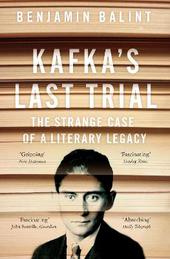
|
Kafka's Last Trial: The Case of a Literary Legacy
Paperback / softback
Main Details
Description
When Franz Kafka died in 1924, his loyal friend and champion Max Brod could not bring himself to fulfil Kafka's last instruction: to burn his remaining manuscripts. Instead, Brod devoted the rest of his life to canonizing Kafka as the most prescient chronicler of the twentieth century. By betraying Kafka's last wish, Brod twice rescued his legacy - first from physical destruction, and then from obscurity. But that betrayal also led to an international legal battle over which country could lay claim to Kafka's legacy: Germany, where Kafka's own sister perished in the Holocaust and where he would have suffered a similar fate had he remained, or Israel? At once a brilliant biographical portrait of Kafka and Brod and the influential group of writers and intellectuals known as the Prague Circle, Kafka's Last Trial offers a gripping account of the controversial trial in Israeli courts - brimming with dilemmas legal, ethical, and political - that determined the fate of the manuscripts Brod had rescued when he fled with Kafka's papers at the last possible moment from Prague to Palestine in 1939. It describes a wrenching escape from Nazi invaders as the gates of Europe closed; of a love affair between exiles stranded in Tel Aviv; and two countries whose national obsessions with overcoming the traumas of the past came to a head in a fascinating and hotly contested trial. Ultimately, Benjamin Balint invites us to question: who owns a literary legacy - the country of one's language and birth or of one's cultural and religious affinities - and what nation can claim a right to it.
Author Biography
Benjamin Balint taught literature, including Kafka, at the Bard College humanities programme at Al-Quds University in Jerusalem. His first book, Running Commentary, was published by PublicAffairs in 2010. His second book, Jerusalem: City of the Book is co-authored with Merav Mack. His reviews and essays regularly appear in the Wall Street Journal, Die Zeit, Haaretz, the Weekly Standard, and the Claremont Review of Books. His translations of Hebrew poetry have appeared in the New Yorker and in Poetry International.
ReviewsA literary battle that became Kafkaesque . . . remarkable . . . I warmly recommend this deeply absorbing book. * Daily Telegraph * [A] fascinating and forensically scrupulous account of the history of Kafka's papers. -- John Banville * Guardian * Balint fascinatingly examines how much was at stake for Germany and Israel in claiming Kafka as their man . . . [He] has minutely researched every twist and turn of this politico-legal saga, and tells it with even-handed seriousness. * Sunday Times * Balint's account of this saga is both a fine journalistic telling of that half century of courtroom drama, and a revealing examination of the writer and the relationships at its heart . . . Balint brings all of these forces and arguments to vivid life. * Observer * Absorbing . . . Not only does Mr Balint ask, "Who owns Kafka?" He explores the meaning of a writer's legacy in an age that, like Kafka's disorienting stories, puts identity and belonging in doubt. * The Economist * Dramatic and illuminating . . . raises momentous questions about nationality, religion, literature, and even the Holocaust. * The Atlantic * Kafka's Last Trial is a legal and philosophical black comedy of the first order, complete, like all the best adventure stories, with a physical treasure to be won or lost . . . : the absurdity of our modern obsession with 'authenticity' and 'ownership' * Spectator * The question of who owns Kafka is at the heart of Benjamin Balint's thought-provoking and assiduously researched Kafka's Last Trial. * Literary Review * Gripping and knotty. * New Statesman * Balint handles these complicated claims and counter-claims with great care. He has read widely in the literature about Kafka and provides a fascinating account of the Jewish world of early 20th century Prague, which formed Kafka and Brod . . . Above all, he brings Brod to life . . . Balint is an extremely interesting writer and critic. * Standpoint * Thrilling and profound, Kafka's Last Trial shines new light not only on the greatest writer of the twentieth century and the fate of his work, but also on the larger question of who owns art or has a right to claim guardianship of it . . . [Balint's] research and lively intelligence deliver insights on every page. -- Nicole Krauss Who should inherit Kafka? . . . Searing questions of language, of personal bequest, of friendship, of biographical evidence, of national pride, of justice, of deceit and betrayal, even of metaphysical allegiance, burn through Balint's scrupulous trackings of Kafka's final standing before the law. -- Cynthia Ozick, Orange prize-shortlisted author of Foreign Bodies
|